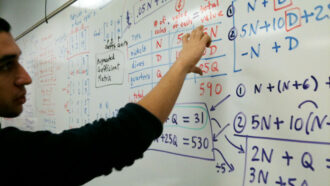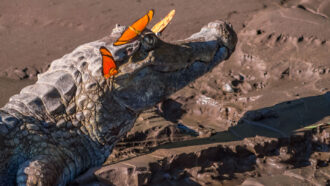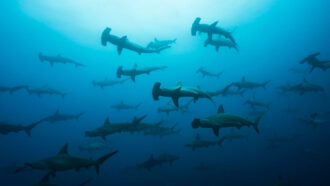
Bethany Brookshire was a longtime staff writer at Science News Explores and is the author of the book Pests: How Humans Create Animal Villains. She has a B.S. in biology and a B.A. in philosophy from The College of William and Mary, and a Ph.D. in physiology and pharmacology from Wake Forest University School of Medicine. She was a 2019-2020 Knight Science Journalism Fellow at MIT, the winner of the Society for Neuroscience Next Generation Award and the Three Quarks Daily Science Writing Award, among others.

All Stories by Bethany Brookshire
-
 Health & Medicine
Health & MedicineFive questions about COVID-19 vaccine trials in teens, answered
Scientists are now testing COVID-19 vaccines in teens. Why do teens need a separate trial? And what would happen? We’ve got answers.
-
 Health & Medicine
Health & MedicineLet’s learn about taste
Taste tells us what’s good to eat, but scientists are still learning about how it works.
-
 Health & Medicine
Health & MedicineScientists Say: Body Mass Index
This is someone’s weight in kilograms divided by the square of their height in meters. But it’s not a measure of someone’s health.
-
 Chemistry
ChemistryScientists Say: Molecule
A molecule is a group of atoms linked with chemical bonds. It’s the smallest particle of a substance that has all of its chemical properties.
-
 Physics
PhysicsLet’s learn about gravity
Gravity is an attraction between objects with mass. The more massive the object, the more gravity it’s got.
-

Scientists Say: Respiration
Breathe in and out, that’s respiration. Have a cell break down sugars for energy, and that’s respiration too.
-
 Brain
BrainLoneliness makes our brains crave people
An area of the brain that lights up when hungry people see food also revs up when lonely people see social activities.
-
 Brain
BrainA taste map in the brain is a scattering of tiny flavor islands
Some senses are highly organized in the brain. Taste is not. And that points to just how important it is.
-
 Math
MathScientists Say: Algebra
Algebra is a type of mathematics that studies symbols and how they can be shifted around.
-
 Tech
TechTracking Santa with science
Santa may be magical. But the North American Aerospace Defense Command (or NORAD) uses science to track his journey.
-
 Animals
AnimalsScientists Say: Lachryphagy
Some insects land on the eyeballs of larger animals. They are seeking out the salt and proteins in the animal’s tears.
-
 Animals
AnimalsLet’s learn about sharks
This ancient group of fish can use scent and even electricity to detect their prey. And they fill an important niche in the ocean.